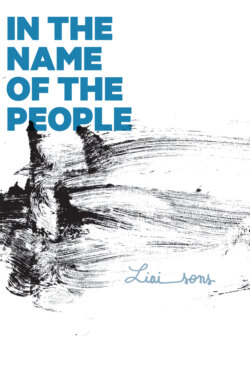Читать книгу In the Name of the People - Liaisons - Страница 18
На сайте Литреса книга снята с продажи.
THE GRANDFATHERS’ WAR
ОглавлениеOur generation, which came into the world near the end of the Soviet Union, still remembers the myth of the Great Fatherland War. When we were children, we played at war—and it was always the same war. It was a war between us and the bad guys, the German fascists. We knew our enemy from the old Soviet movies. The new streets of my neighborhood, built in the eighties, were named after Soviet war heroes, and in the street you could never escape all the monuments of the great Red Army and the martyrs of the war. Some of our cities were even considered “heroic cities.” My grandfather was a veteran, and for big events, he would proudly take out his medals to wear.
During the nineties, when the news was filled with strange camouflaged men with guns, I couldn’t connect these images with the story of my grandfather and the monuments to the heroes. That war—the war of all the movies and the songs—was the sacred war. That war was full of heroism and purity. What we saw on television just seemed like a nameless bloodbath, a war full of confusion.
In “the country that defeated fascism,” oddly enough, no serious theory of fascism ever emerged. For the common Soviet citizen, fascism just meant the epitome of evil and abjection. But in the subculture of prison gangs, for example, tattoos of swastikas and other Nazi insignia were considered symbols of a radical denial of the state. These symbols did not have the same meaning in the West, and in Russia, antifascism came to mean something different.
This difference was a question of onomastics, established first through the act of giving a name. In the Soviet Union, World War II was called the Great Fatherland War, and was considered, in Soviet historiography, as part of the eternal fight to defend the fatherland. The term “Fatherland War” is a name that was already used during Napoleon’s invasion of Russia. In the late thirties, and even more so during the war, Stalin and his propagandists began to speak of Soviet history within the wider historical context of the Russian Empire. This propaganda constructed the narrative of an unending struggle against the invaders from the West: from Alexander Nevsky in the thirteenth century to the Napoleonic invasion in 1812. This glorification of feudal and aristocratic heroes would have been impossible to imagine even a few years before, but, for the purposes of mobilization, of course it wouldn’t hurt to sacrifice a few principles. Because who, if not we, the Great Russian People, could smash fascism and liberate Europe? As the war dragged on, it became not only a fight against fascism, but a war against that insistent invader, who arrived again and again to conquer our sacred Russian land.
According to this logic, the enormous human losses during the war were not due to the failures of the Soviet state, but were a martyrdom of necessity. They were a sacrifice that fits comfortably within the old story of the God-chosen Russian Nation, humbly taking on the burden of others and saving Europe from eschatological disasters, again and again.
In the context of the repression of the thirties, ethnic deportations were massive. As this trend continued during the war, the deportations were justified through accusations of Nazi collaboration. Russian ideologists love to mention collaborator units formed by Nazis during the war, composed of different Soviet ethnic groups. By creating the figure of Traitor-Nations, they are able to omit the fact that most collaborators were actually ethnic Russians, in order to legitimate colonial politics and ethnic repression.
Through this revisionism, the state has successfully created an equivalency between the Soviet subject and the antifascist. By essence, a Russian is antifascist, and thus being against Russians means being fascist. Anybody standing against Moscow for any reason now became fascist by default. In this framework, victory could only be achieved through national unity, and being Russian meant being loyal. Now any protest against central power could be easily reframed in these simplistic terms.
